

How your body clock impacts breast cancer. Are you a lark or an owl? Image copyright Science Photo Library Whether you prefer being up at dawn or burning the midnight oil depends on your genes, experts have found.
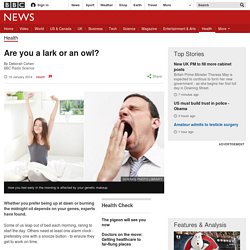
Some of us leap out of bed each morning, raring to start the day. Others need at least one alarm clock - preferably one with a snooze button - to ensure they get to work on time. And some of us happily stay up chatting until the wee small hours, while others prefer to be tucked up listening to 'Book at Bedtime' with the lights turned out. We really are divided into larks and owls. He says: "Whether we like it or not our parents are telling us when to go to bed - based on the genes that they gave us.
" Scientists have come to realise the importance of understanding a person's chronotype, the time of the day when they function the best. Knowing how much of a lark or an owl we are should help us live more healthily in the modern 24/7 world. Rick Neubig, a professor of pharmacology in Michigan, is an extreme lark. And it runs in his family. But they don't. Are you a morning lark or night owl? Take the quiz - Hungry? Are You a Lark, Owl, or Hummingbird? “Laugh and the world laughs with you, snore and you sleep alone.” — Anthony Burgess When it comes to sleep patterns, some people really are night owls or early birds.
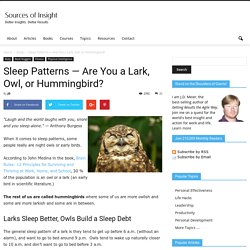
According to John Medina in the book, Brain Rules: 12 Principles for Surviving and Thriving at Work, Home, and School, 30 % of the population is an owl or a lark (an early bird in scientific literature.) The rest of us are called hummingbirds where some of us are more owlish and some are more larkish and some are in between. Larks Sleep Better, Owls Build a Sleep Debt The general sleep pattern of a lark is they tend to get up before 6 a.m.
In general, this means larks tend to get better sleep in our society, and owls build a sleep debt. I think the key is to know yourself and find what works for you, but this is another lens for looking at your own sleep patterns over your life time. Larks Catch the Early Worm Larks are the early birds that catch the worm. Via Brain Rules: Owls Burn the Midnight Oil Sleep patterns show up early. Geneticists clock genetic differences between 'larks' and 'night owls' A new study by geneticists from the University of Leicester has for the first time identified the genetic clues behind what makes you a 'lark' or an 'owl'.
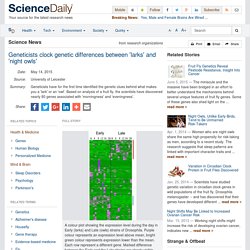
Based on analysis of a fruit fly, the scientists have discovered nearly 80 genes associated with 'morningness' and 'eveningness'. Researcher Dr Eran Tauber, one of the three authors of the study, published in the journal Frontiers in Neurology, said: "Most people find that their performance is at peak at specific times of day.
A great variation in this diurnal preference is found, from early risers 'larks' to late night 'owls'. The impact of this preference ('chronotype') on health and behaviour is well documented, but the molecular basis is largely unknown. "In this new study, we have used fruit flies, whose gene clocks are very similar to human, to get a first insight into the molecular basis of 'morningness/eveningness' preference. "Our study is the first stepping stone to identifying which genes are involved in this process. Are You a Lark, an Owl, or a Hummingbird? One in ten of us is an up-at-dawn, raring-to-go early bird, or lark.
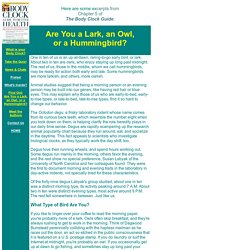
About two in ten are owls, who enjoy staying up long past midnight. The rest of us, those in the middle, whom we call hummingbirds, may be ready for action both early and late. Some hummingbirds are more larkish, and others, more owlish. Animal studies suggest that being a morning person or an evening person may be built into our genes, like having red hair or blue eyes. This may explain why those of us who are early-to-bed, early-to-rise types, or late-to-bed, late-to-rise types, find it so hard to change our behavior. The Octodon degu, a frisky laboratory rodent whose name comes from its curious back teeth, which resemble the number eight when you look down on them, is helping clarify the role heredity plays in our daily time sense. Degus love their running wheels, and spend hours working out.
Go60 - Are You a Morning Lark, Hummingbird or Night Owl? “The world is composed of morning people (larks), night people (owls) and those in the middle (hummingbirds).
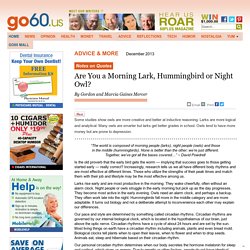
None is better than the other; we’re just different. Together, we’ve got all the bases covered…” ~ David Powdrell Is the old proverb that the early bird gets the worm — implying that success goes to those getting started early — really correct? Increasingly, research tells us we all have different body rhythms and are most effective at different times. Those who utilize the strengths of their peak times and match them with their job and lifestyle may be the most effective among us.
Larks rise early and are most productive in the morning. Our pace and style are determined by something called circadian rhythms. Our personal circadian rhythm determines when our body secretes the hormone melatonin for sleep and cortisol, which gives us energy. Some studies show owls are more creative and better at inductive reasoning. Larks tend to be happier.
Meet Gordon. Are you a lark or a night owl? What your sleep habits reveal about your health. By Kate Wighton for the Daily Mail Published: 21:23 GMT, 12 August 2013 | Updated: 01:27 GMT, 13 August 2013 Evening meals and late-night snacking mean owls may be larger than larks You're up at the crack of dawn, raring to go, while your other half is dead to the world.
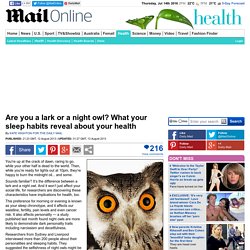
Then, while you’re ready for lights out at 10pm, they’re happy to burn the midnight oil... and some. Sounds familiar?